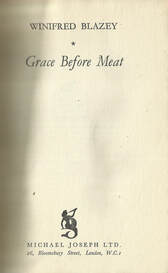
In short, Winifred Blazey welcomes her readers into the worlds she creates, and she lets us fully understand why all those little details matter to her protagonists, and why those details should in turn matter to her readers. With her début book, Dora Beddoe (1936), it was those specifics of her unhappy antihero’s bleak and monotonous existence that allowed us to understand the character’s desperate murderous mood. In Indian Rain (1938), the author’s most accomplished story, traveler Lovat Cleave absorbs all the kindnesses and cruelties humans are capable of before he begins to understand himself. And even the author’s weakest book, 1941’s The Crouching Hill, is filled with details that bring into sharp relief the group of visiting schoolmistresses, their young charges, and the dreary lodging house where tragedy strikes.
Grace Before Meat, then, is nothing more nor less than the story of an outsider learning the ways of the community she chooses to invade, while gradually understanding how to align her own progressive ideals with the stubborn but pragmatic code of the locals. For Barbara, it is a story of incremental survival, of tiny battles won, of ground gained or retreated from on a daily basis. And it is in these details that the novel provides much of its engagement, for we want to see Barbara succeed. While the character has a strong work ethic and can stand up for herself, Blazey takes care to balance those admirable qualities with vulnerabilities fitting a woman just out of adolescence: Barbara is also proud and self-assured to the point of vanity on occasion, but usually has the good sense to realize her flaws after the fact.




 RSS Feed
RSS Feed